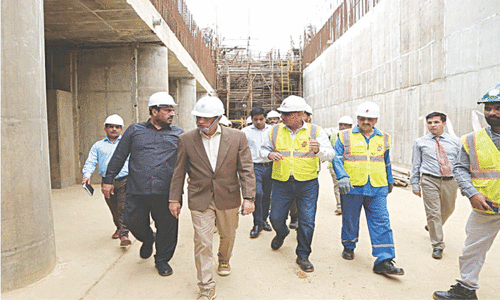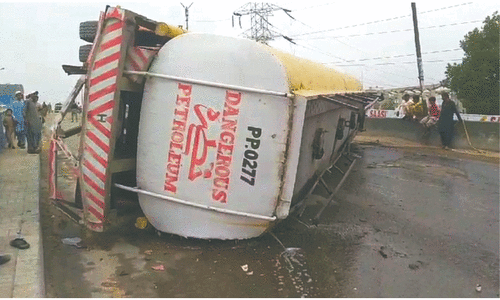KARACHI: The long absence of a mass transit system in Karachi and use of poor quality fuel are major factors behind the city’s highly degraded air. What has added to the environmental disaster is the government decision to allow operation of a number of coal-based projects with little checks.
These points were raised by experts at a seminar on pollution-free transport organised by the National Forum for Environment and Health, a non-governmental organisation, at a hotel here on Wednesday.
Giving a presentation on the subject, Dr Mohammed Raza Mehdi, a professor and co-chair at the department of urban and infrastructure engineering, NED University of Engineering and Technology, referred to the World Health Organisation’s data according to which polluted air caused around 865,000 premature deaths every year and emissions from transport were a major factor degrading air quality.
“It is high time that public awareness is created on transport emissions. The situation has reached a point that suggests that doing nothing is no longer an option,” he said.
According to him, traffic problems in developing countries such as Pakistan are different from what is experienced in the developed world.
“Apart from the fact that we lack traffic discipline and compliance [with] the law, not all of our oil refineries have the capacity to develop a fuel according to the European specifications,” he said, adding that Pakistan’s transportation largely consisted of buses and trucks being run on diesel, causing air pollution.
Pointing out some other transport problems causing air pollution, Dr Mehdi said that unlike Western and some African countries where goods were transported by railway, an eco-friendly system, around 90 per cent cargo in Pakistan was transported through roads that not only destroyed the network and led to traffic congestion, but also degraded air.
Data suggested that carbon emissions had steadily increased in Pakistan and there was a dire need that a system was developed to monitor these hazardous emissions.
He recommended improvement in fuel quality and ensuring fitness of vehicles as important measures to check air pollution.
“The government needs to properly implement relevant laws relating to registration, licensing as well as fitness of vehicles. In addition, awareness should be created about the hazards of air pollution and how people could play their role in this regard,” he said, warning that Pakistan would have to face huge economic challenges if nothing was done about increasing air pollution.
Transport operators, he suggested, should be given representation on the National Highway Authority’s executive board as they were not satisfied with its services.
In the end of his presentation, he shared results of a study conducted on diesel-based passenger transport in Karachi that showed that nitrogen oxide acquired the highest concentration among all greenhouse gases discharged from these vehicles.
‘Forty people for one seat’
Saquib Ejaz Hussain, an air quality expert, highlighted the challenges posed by poor air quality across the country and how provincial governments had turned a blind eye to the problem.
“Only the Balochistan Environmental Protection Agency has submitted a reply to the notice the Supreme Court had sent to all provincial governments over air quality,” he said, adding that tests had shown that indoor pollution was much more serious than outdoor pollution at some places in the country that had no standards on indoor pollution.
According to him, only two detailed studies had been conducted on Pakistan’s air quality so far. The last one was in 2005-06, which showed that the concentration of extremely hazardous pollutants was much higher than the WHO permissible limits in Karachi, Lahore, Rawalpindi, Islamabad, Peshawar and Quetta.
On Karachi, he said that an absolute failure on part of the government to bring about a mass transit system and develop the fast-growing city according to a master plan had led to what he described as a “collapsed state of the city”.
“From 2005 to 2015, 50pc of city’s area has been used for infrastructural development constituting largely high-rises. And, regrettably, this process continues as we see new big residential and commercial projects within and around the city’s limits,” he said.
The 14-kilometre-long coastal belt of Karachi, Mr Hussain said, had been declared a high-density zone that means development of more high-rise buildings.
Speaking about Karachi’s transport woes, he said there had been an exponential increase in vehicle ownership in recent years as public transport had almost vanished from the roads and it was estimated a few years ago that 40 people compete for one seat in the public transport of Karachi.
One solution to the transport problem, he said, was revival of the Karachi Circular Railway for which the Japan International Cooperation Agency had extended full financial support but asked for land to settle and rehabilitate displaced persons.
“But the government refused,” he said, referring to government decisions which degraded environmental conditions, including commercialisation of 26 city roads, declaring Block 1 and Block 2 of Clifton as high-density zones and allowing the establishment of coal yards near residential areas.
“We can’t meet air standards even at night and that’s because we have allowed this practice of burning municipal waste,” he informed the audience, citing recent data from the Sindh Environmental Protection Agency that showed high concentration of hazardous air pollutants in city’s air.
Assistant commissioner Sara Javed, representing the DC South office, underlined the need for inculcating a sense of responsibility in individuals and communities.
Published in Dawn, April 12th, 2018















































Dear visitor, the comments section is undergoing an overhaul and will return soon.